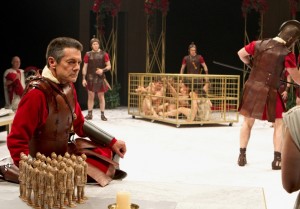In August and September, Stratford, Ontario attracts theatrical pilgrims from around the world for the Stratford Shakespeare Festival, held every year since 1953. During the festival, the town, which is named in homage of the birthplace of renowned British playwright William Shakespeare, revolves around its lively theatre district.
Each fall, UR English professor Russell Peck organizes a trip — with the assistance of the English Department — to bring a group of UR students to the festival to enjoy the plays. According to Peck, the Stratford program is the “most successful” part of the English department’s ongoing effort to encourage undergraduates to venture off campus. On this year’s trip — which lasted from Friday, Sept. 23 to Sunday, Sept. 25 — the line-up included five productions, ranging from dark Shakespearean tragedies to a lighthearted, modern musical.
“Richard III”
Shakespeare’s 16th-century tale of the Machiavellian King Richard’s rise to power through the systematic murder of his royal brethren is regarded as one of the Bard’s greatest history plays. Director Miles Potter made the bold decision to cast actress Seana McKenna for the lead role of Richard. However, with the character’s androgynous wardrobe, limping gait and hunched back, it soon became clear she was chosen more on merit than for avant-garde casting. McKenna demonstrated an extraordinary range of convincing emotions — from hubris to self-loathing, from frivolity to desperation — with seamless transitions in between.
With Richmond’s (Gareth Potter) forces advancing on the battlefield and Richard’s fate sealed, McKenna’s pitiable wail gave me pause in declaring judgment on the otherwise decisively evil character.
In a grievous scene, Michael Spencer-Davis also gave a notable performance as the Duke of Clarence with the realization of his brother Richard’s betrayal and his imminent execution. The intensity of the play’s final battle was magnified by its staging as a slow motion clash with the ghosts of Richard’s victims coming together to prevent his attacks.
“Camelot”
Writer Alan Jay Lerner and omposer Frederick Loewe’s musical retelling of T.H. White’s “The Once and Future King” mixes orchestration and levity into this classic Arthurian legend. The show opened with a display of live falconry, as Merlyn (Brent Carver) transformed the young Arthur (Geraint Wyn Davies) into a bird for his lessons.
There were other attempts to adapt the musical to a 21st century audience, but the script still suffered from the dated humor of its 1960 origin. The exposition was laborious and characters developed into unsympathetic caricatures. Lancelot’s (Jonathan Winsby) overzealous drive for excellence and excessive French mockery were grating and made it difficult to understand how Queen Guenevere (Kaylee Harwood) could stand him, let alone fall in love with him. Meanwhile, Guenevere seemed too entitled, with her opening song lamenting the life of a queen. When Lancelot literally resurrected a knight from the dead, I couldn’t help but chortle at the over-the-top absurdity.
Still, the show occasionally had genuine moments. Arthur’s struggle to decide between his love for Guenevere and the sanctity of his chivalric order was even touching.
“Titus Andronicus”
Shakespeare’s dark revenge tragedy “Titus Andronicus” offers gratuitous sexuality and violence, which transcends even the most graphic of Quentin Tarantino films. When Titus (Wayne Best) executes the son of Tamora (Claire Lautier), Queen of the Goths, he triggers an escalating cycle of vengeance. Plotting the annihilation of the Andronicus clan, Tamora symbolically swept away a squadron of wooden soldiers representative of Titus’ 26 sons.
In the first act, her Moor lover, Aaron (Dion Johnstone), arrange the deaths of the Andronicus men, while her sons, Chiron (Brendan Murray) and Demetrius (Bruce Godfree), rape Titus’ daughter Lavinia (Amanda Lisman) and slice off her tongue and hands. Her shattered wailing after the trauma filled the harshly illuminated stage.
Lavinia, however, gets her revenge when she disemboweled the brothers with blades fastened to her stumps — an artful touch that went beyond Shakespeare’s original vision. The lights were dimmed and reddened for these graphic sequences, allowing audience members’ imaginations to fill in the blanks. The on-stage carnage climaxed in the final scene as Goth invaders stormed the Roman palace while Titus struck at the emperor. The chaotic scene obfuscated and intensified the clash, and we were unable to keep track of the survivors until the final dust had settled.
“Homecoming”
In Harold Pinter’s satire of a dysfunctional British family, all ideas of traditional theater were turned on their head. Plot was inconsequential in the presence of irrational characters, and meaning was conveyed through the frequent pauses rather than in the erratic dialogue. The story followed the return of Teddy (Mike Shara) and his wife Ruth (Cara Ricketts) to his childhood home, where — since the death of his mother — the family’s relationships have curdled.
Every elephant in the room spoke loudly in this play. Upon meeting Ruth, the father (Brian Dennehy) immediately and vocally classifies her as a prostitute. This accusation later proves somewhat accurate when she makes out with Teddy’s brother Joey (Ian Lake) in front of the whole family. In each of these scenarios, the actors coldly responded as if nothing strange had happened, allowing the audience to wonder whether the events were merely imaginary.
“The Misanthrope”
On the final day of the festival, Molière’s rebuke of French bourgeoisie hypocrisy portrayed the critical Alceste’s (Ben Carlson) quest to win the heart of Célimène (Sara Topham). With nothing productive to do, the French nobility engage in constant gossip. Alceste, desiring honesty, insults his peers bluntly and hilariously, and they don’t quite know how to react.
True to the original French, the show was done in rhyming couplets, paralleling the artificial content of their dialogue — but the Dr. Seussian dialogue did develop into an irritating sing-song after a while. This did not detract from the message and the actors’ powerful performances, though. Célimène’s constant social machinations made me skeptical of her throughout the play, yet I still believed her genuine love for Alceste when she desperately offered to become his wife. Consistently funny execution made the 18th century issues relevant and witty for a modern audience.
Raybin is a member of the class of 2012.






